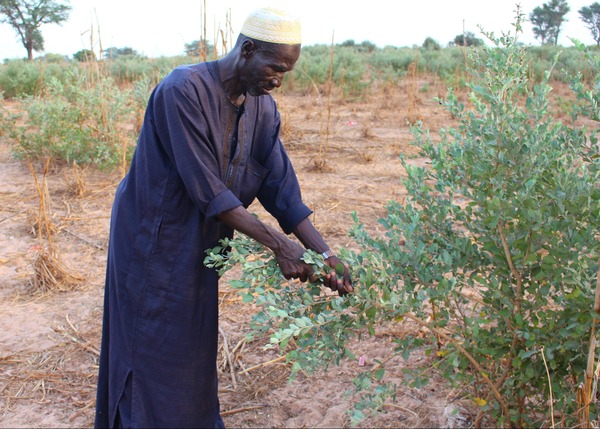18 km from Fatick in the small Serer town of Niakhar, Senegal most of the population are farmers. But in the Sine, the farmers are worried. The price of fertiliser has doubled in this area. "The price has risen enormously in a short time, from 7,000 CFA francs to 15,000 CFA francs per kilogram, which is out of our reach. We don't have the means to buy fertiliser, so we try to decrease our use" says Youssou Faye, a local farmer. According to him, it is inconceivable that in a country like Senegal, that produces fertiliser, this input could see such a large price increase.
For more than two years, these farmers have been gradually abandoning fertiliser, using innovative techniques acquired through the Sustainsahel project."These techniques are a godsend for us. Today we are using manure, mulching and other techniques and it is working very well, our land is becoming more and more productive," explains Youssou Faye. In the same vein, Sokhna Faye, a farmer from the village of Tokasso (Niakhar), continues: "Today, we are living with high fertiliser prices, and it so happens that the new innovative techniques of the SustainSahel project are a solution to this crisis for us producers."
The SustainSahel project's main objective to promote practices that improve soil quality and yield, but also enhance soil resilience. This project focuses on best practices that integrate trees/shrubs and livestock into production systems. Such practice are often already existing, this has allowed the fruitful collaborations and innovations of new practices such as, the use of the Guiera Senegalensis tree and the Faidherbia albida tree to increase crop yields, or mulching with Guiera leaves, amoung others.
This project, which has been running for more than two years in Senegal, Burkina Faso and Mali, is considered innovative and has been extended to several plots of land, and is now with the increased fertiliser prices, making Niakhar farmers very happy. They use the different techniques, especially mulching, which has been unanimously approved. Many farmers have testified to its effectiveness: "I work with SustainSahel researchers, and we took the leaves of the Guiera tree and scattered them on the ground, and I saw that my millet crops were much more productive. I tried the same technique this year, with the naked eye you could clearly see the difference compared to the other plots where I had not put Guiera. Today, I am sharing the mulching practice with my friends. So that they should no longer burn the Guiera leaves, but use them in their crops, as it is much better than fertiliser, especially as it is becoming increasingly expensive."
Another farmer added: "I can never thank the researchers enough, since we started experimenting with new practices on my farm, I have a very good harvest. For more than 20 years, I have not seen my field so productive, I am very satisfied with their work - I will never burn Guiera again. The project has helped me improve my land a lot, but some species, such as Guiera, are not available in Tokasso, but are found in Sanghaï. On the other hand, we have a lot of Faidherbia Albida on our land and they are very beneficial for our soils if we have seven of them in our field with or without fertiliser we will have a good harvest. I hardly use fertiliser anymore."
The use of synthetic fertilisers, in addition to impoverishing producers, can have harmful consequences for human, animal and environmental health in the short or long term. In the face of high fertiliser prices, these innovative techniques from the SustainSahel project have come at the right time, if the farmers of Niakhar are to be believed. In addition to being aware of the important role they play in preserving the ecosystem, they are committed to using and disseminating these methods to ensure good harvests while preserving their land and not spending their money on chemical fertiliser.
Written by: Fatim Lô Ndéye, Senegal, CSE

 tap and then scroll down to the Add to Home Screen command.
tap and then scroll down to the Add to Home Screen command.